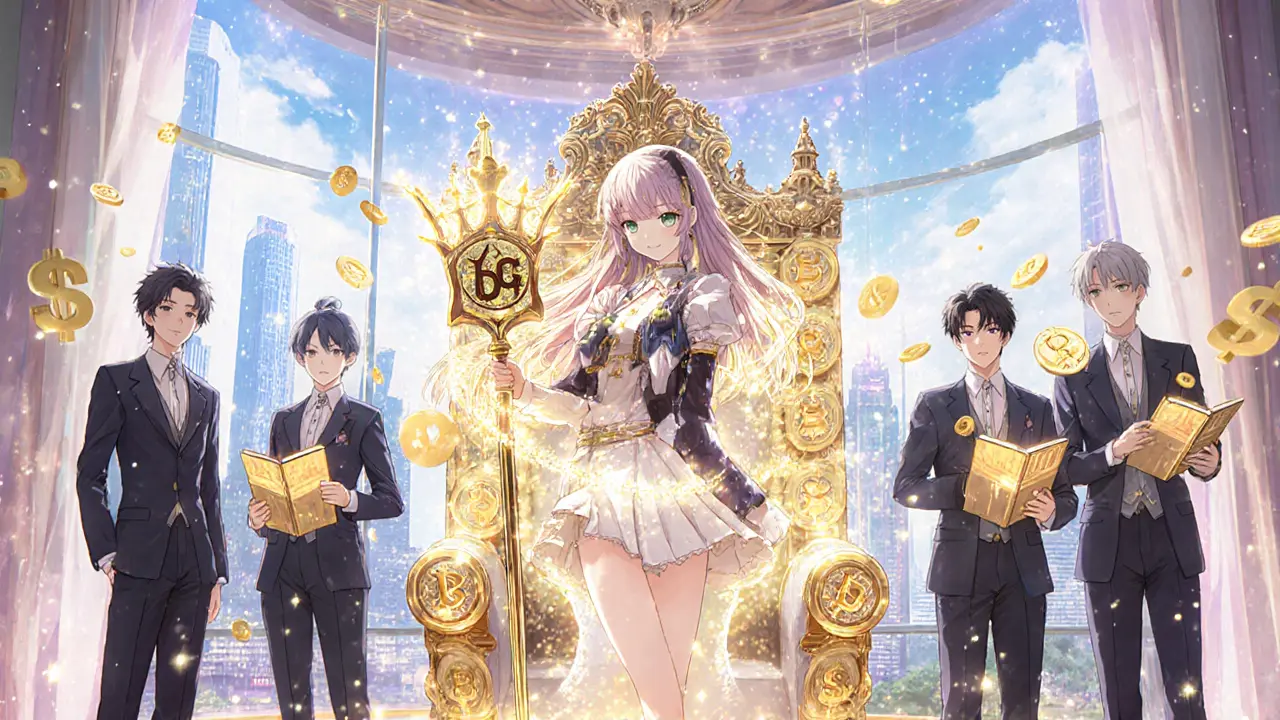Bgogo Exchange Fee Calculator
Bgogo offers a unique 105% fee rebate model where traders receive BGG tokens worth 105% of their trading fees. This calculator helps estimate your potential savings compared to standard exchanges with 0.1% fees.
Your Estimated Monthly Savings
How Bgogo's Fee Rebate Works
Standard Exchange Fee: Typically 0.1% of trade value
Bgogo's 105% Rebate: You get BGG tokens worth 105% of the fee paid
Example: For a $1,000 trade at 0.1% fee = $1 fee → Receive $1.05 worth of BGG tokens
Bgogo is a digital asset exchange platform launched in July2018 that markets itself as a community‑governed crypto exchange. Headquartered in China and led by CEO ZhangYibo, the service promises transparency, a unique supernode listing system, and a negative‑fee trading model powered by its native BGG token.
Quick Take
- Bgogo exchange review: innovative governance, but limited recent activity data.
- Supernode holders earn a 20% share of commission on the tokens they list.
- Traders receive a 105% fee rebate in BGG within 30minutes of each trade.
- Mobile app is Android‑only (via Aptoide) and lacks iOS support.
- Compared with Binance, Coinbase and Kraken, Bgogo lags on volume, liquidity, and regulatory compliance.
Platform Overview
From day one Bgogo promised to be “by the community, for the community.” The promise hinges on two pillars: the supernode system and the BGG token economics. The exchange’s user‑interface mirrors typicalWeb2.0 designs-candlestick charts, order‑book depth, and one‑click market orders. However, its legal footprint is fuzzy: the site lists a Chinese phone number (+8615175285924) but offers no licensing details from known regulators (e.g., ASIC, FCA).
Supernode Governance
The Supernode system is Bgogo’s most distinctive feature. A supernode is essentially a large BGG holder granted the “one‑vote, one‑listing” right to nominate a new cryptocurrency for the exchange. During the nomination period, the supernode also locks in a lifelong 20% share of the trading commission generated by that token. All supernode holdings are displayed publicly on the website, offering an unprecedented view of who controls listing decisions.
Pros:
- Empowers high‑stakes investors to shape market offerings.
- Transparent holder list reduces covert lobbying.
Cons:
- Concentrates influence among a few large BGG whales.
- Potential conflict of interest if a supernode pushes a token they already own.
BGG Token Mechanics
The native token, BGG (ticker: BGG), fuels every incentive on the platform. Its key functions are:
- Fee rebate: After each trade, the exchange automatically credits the trader with BGG tokens worth 105% of the fee paid. The credit appears in the user’s wallet within 30minutes, effectively turning fees into a short‑term profit.
- Daily buy‑back: 100% of collected commissions are used to purchase BGG on the open market. These tokens are sent to a public burn address, creating a deflationary pressure.
- Supernode collateral: Holding BGG qualifies users for supernode status, unlocking governance rights and commission shares.
Because the buy‑back is transparent-transaction hashes are posted on‑chain-the mechanism builds credibility. Yet, the token’s market depth is thin; most BGG trades happen on decentralized exchanges like Uniswap, with price data tracked on platforms such as CoinCarp.

Mobile Application & Core Features
Bgogo’s mobile experience is delivered through an Android app distributed on Aptoide. The app mirrors the desktop dashboard, offering:
- Deposit and withdrawal of major cryptocurrencies (BTC, ETH, USDT, BGG).
- Real‑time market data and price alerts.
- One‑click participation in supernode voting.
- Access to platform news via integrated Medium feed.
Notably, there is no iOS version, limiting accessibility for a sizable segment of the crypto community. Security‑wise, Bgogo claims to use industry‑standard SSL encryption and cold‑storage for the majority of assets, but third‑party audits are not publicly available.
How Bgogo Stacks Up Against Major Exchanges
| Feature | Bgogo | Binance | Coinbase | Kraken |
|---|---|---|---|---|
| Launch Year | 2018 | 2017 | 2012 | 2011 |
| Regulatory Licenses | None publicly disclosed | Multiple (e.g., Malta, US) | US Money‑Transmitter, EU | US FinCEN, EU |
| Supported Platforms | Web + Android (Aptoide) | Web + iOS + Android | Web + iOS + Android | Web + iOS + Android |
| Daily Trading Volume (USD) | ~$2‑3M (estimated) | $30‑40B | $8‑10B | $4‑5B |
| Fee Structure | Negative fee (105% rebate) | 0‑0.1% maker/taker | 0‑0.5% maker/taker | 0‑0.26% maker/taker |
| Governance Model | Supernode voting | Binance Coin (BNB) staking, DAO proposals | None | None |
| Key Token | BGG (deflationary) | BNB | USDC, Coinbase Token (COIN) | None |
The table makes it clear: Bgogo offers a novel fee rebate and governance model, but it falls short on liquidity, regulatory clarity, and platform breadth. Traders who value ultra‑low fees and want to influence listings may find it appealing, while most retail users will likely gravitate toward the larger, vetted exchanges.
Pros & Cons Summary
- Pros
- Negative‑fee structure that actually pays you to trade.
- Transparent supernode listings and commission sharing.
- Full commission burn adds deflationary pressure to BGG.
- Backed by Pantera Capital and a tech‑heavy team (Google, Facebook alumni).
- Cons
- Scarce recent data-no clear sign of active development past 2020.
- Limited mobile support (Android only).
- Low trading volume leads to slippage on larger orders.
- Regulatory opacity could affect AML/KYC compliance.
- Supernode power concentrates influence among large BGG holders.
User & Market Outlook
Because public information on Bgogo’s activity dries up after its 2018‑2019 launch window, potential users should approach with caution. The crypto community values transparency, yet the exchange’s most transparent element-the supernode holder list-doesn’t tell you whether those holders are still active. Moreover, the absence of a public audit report means security claims cannot be independently verified.
For investors interested in the BGG token itself, the deflationary model is attractive, but the token’s thin order book makes price manipulation a real risk. If you’re a trader seeking deep liquidity and robust regional support (e.g., compliance with Australian ASIC), established exchanges remain safer choices.
That said, Bgogo’s concept of community‑driven listings could inspire future platforms. Should the team release an updated roadmap, add iOS support, and secure a recognized license, the exchange could carve a niche among fee‑sensitive traders.
Frequently Asked Questions
Is Bgogo still operational in 2025?
Public activity on the website and social channels has been minimal since 2020. While the platform’s domain remains live, there is no verifiable data on trading volume or recent software updates, so users should verify the current status before depositing funds.
How does the 105% fee rebate work?
After a trade, the exchange calculates the fee you paid, multiplies it by 1.05, and credits that amount in BGG tokens to your account within 30minutes. The rebate is automatic; you do not need to claim it manually.
What is a supernode and how do I become one?
A supernode is a large BGG holder granted voting rights to list new tokens and a 20% commission share on the listed token’s trades. To become a supernode you must hold a qualifying amount of BGG (the exact threshold is not publicly disclosed) and register on the platform’s governance dashboard.
Is Bgogo regulated?
Bgogo does not list any regulatory licenses on its website. Unlike Binance, Coinbase or Kraken, there is no clear evidence of registration with financial authorities in major jurisdictions, which may affect KYC/AML compliance for users.
Can I trade BGG on major exchanges?
BGG primarily trades on decentralized venues such as Uniswap and PancakeSwap. Major centralized exchanges like Binance offer guidance on how to acquire BGG, but they do not list it directly for spot trading.


tim nelson
Wow, the 105% rebate really caught my eye. I can see why some traders are buzzing about it. It feels like a nice safety net for those who trade frequently. Just remember to keep an eye on the token price swing.
Zack Mast
Life is just a market, ain't it?
Dale Breithaupt
Bgogo’s 105% rebate is an eye‑catcher in a market flooded with tiny fee discounts.
The math checks out: a $1,000 trade at the typical 0.1% fee costs $1, and you get $1.05 in BGG tokens.
That extra half‑dollar might look trivial on a single trade, but it compounds quickly with volume.
If you execute 50 trades a month, you’re looking at $52.50 worth of tokens instead of just $50 saved elsewhere.
The token price volatility, however, adds a layer of risk that many newbies overlook.
When BGG spikes, the rebate can be worth more than the original fee, turning a cost into a profit.
Conversely, if the token crashes, you might end up holding a loss‑making asset.
Liquidity on the exchange matters too; a thin order book can lead to slippage that erodes the nominal savings.
The supernode staking model also means you can earn passive income, but only if you stake a sizable amount.
Small holders may find the minimum thresholds prohibitive, which narrows the appeal.
Regulatory gray zones surround many of these reward mechanisms, so be prepared for possible policy shifts.
From a user‑experience perspective, the calculator UI is clean, but the disclaimer is buried in fine print.
Transparency about how the 105% is funded is still a bit vague, leaving room for speculation.
Overall, for high‑frequency traders who can afford to hold BGG, the model is compelling.
For casual investors, the added token risk may outweigh the modest fee rebate.
Rasean Bryant
This looks promising! The clear layout makes it easy to experiment with numbers, and the optimism around the rebate is refreshing.
Angie Food
Honestly, 105% feels like a gimmick. If the token crashes, you're just paying extra fees in disguise. Looks like another hype train to me.
Jonathan Tsilimos
From a systemic perspective, the introduction of a super‑node incentive aligns with network‑level security protocols. However, the marginal utility of the rebate diminishes when token volatility surpasses the fee differential. Integration of on‑chain analytics could mitigate this exposure.
jeffrey najar
Great breakdown! The long‑term value really depends on holding BGG, so staying informed on market trends is key.
Rochelle Gamauf
While the concept is innovative, the execution appears half‑baked. The rebate mechanism lacks rigorous auditing, and the token distribution raises concerns about centralization.
Jerry Cassandro
For everyday traders, the calculator offers a quick way to see potential gains. Just remember that the actual payout hinges on BGG’s market performance.
Parker DeWitt
Nice try, but 105% is just a marketing ploy 🤨. If the token tanked, you’d be worse off than paying a normal fee. 🚫💸
Allie Smith
The idea that you can get more back than you paid feels almost philosophical – a reminder that value isn’t always linear.
Lexie Ludens
Another overhyped scheme! They promise supernodes, but deliver nothing but a fancy spreadsheet. The drama is real, the gains are not.
Aaron Casey
From a technical standpoint, the rebate token could serve as a utility layer, enhancing liquidity provisioning. Yet, without robust governance, the model risks becoming a speculative conduit.
Leah Whitney
Keep an eye on the staking requirements – they’ll determine whether small traders can actually benefit without over‑committing capital.
Lisa Stark
Thoughtful approach. Balancing fee rebates with token stability will be the true test of Bgogo’s sustainability.